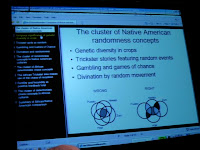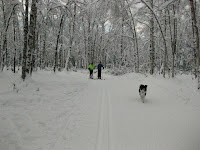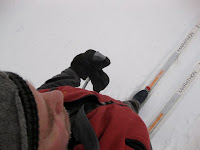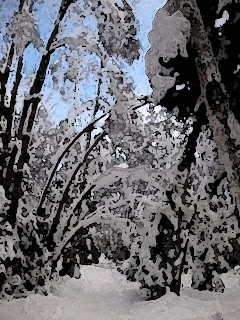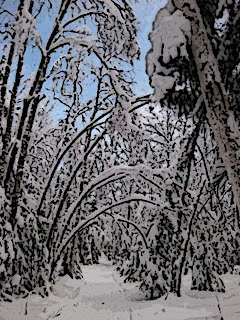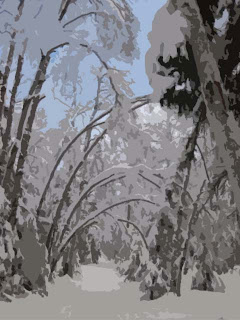We just got back from seeing
Milk, the movie.
I'm not quite sure what to say. I found it incredibly powerful. I think everyone should go see the movie. It has everything a good movie needs - sex, violence, villains, heroes, and powerful acting. I'm trying to imagine someone who feels that homosexuality is evil going to see that movie. I can't imagine that at least a tiny crack wouldn't appear in his or her world view. Maybe my imagination just isn't strong enough.
But while the movie is ostensibly about the battle for gay rights, for me it's about the battle for human rights and justice. (Milk, at one point in the movie gets angry at the other politicians who want to avoid mentioning gays in the fight against an anti-gay rights amendment. They think it is politically safer to talk about civil rights. So I want to be clear, this IS a movie about gay rights. But is also about all human rights.) Any human being who has red blood flowing through her veins has to be touched by this movie on some level. I couldn't help but be affected by a man standing up in the face of overwhelming odds, and simply refusing to accept injustice. Not being timid, not being politic, but standing up and speaking his truth the world.
It causes me to think about my style here. I don't write in declaratory sentences. I try to imagine how someone who disagrees with me thinks about the issue. I try to figure out what someone would have to believe - what facts, what values - that lead him to a conclusion different from mine. Sometimes my gut just wants me to declare "That's bullshit." But then I erase it and start trying to examine the ideas more closely. And sometimes, in my own understated way, I do say, "That's bullshit." But it's pretty rare.
During the Vietnam war protests, I came to see that there is a role for different approaches. The way-out-there radicals who invaded draft boards and poured blood on the draft records pushed the debate into territory it had never been. They were often intemperate, obnoxious, and self-righteous, but they created a lot more room on the debate floor. Others, who would have seemed extreme had the more aggressive protesters not existed, then began to seem reasonable in comparison.
Milk, as portrayed in this film, seemed to be able to do both. He managed to push the debate into new territory, yet he managed to be reasonable and understanding.
I've tended to think that each of us should do what we do best. It is hard for me to stand up and declare truth when I can see lots of different perspectives. On many issues I know which one I think is 'right' but understanding why others think something else is right, seems to be the opening to find non-violent solutions. But Milk also reminds me that we can sometimes use logic and reason as a way simply to be safe, to not take the necessary risks. He shows that if we speak from our hearts, others will hear us, others who are afraid to take that step. He died because he stood up, but if he hadn't stood up, he wouldn't have lived either. He moved civil rights in the US a long way forward.
So this film, for me, raises questions about how I want to live the rest of my life. Milk reminds me how much someone can accomplish when they focus. As I've compared my approach to those of some other bloggers, I've concluded that I tend to have a general goal of pushing people to see things they haven't seen before; that my subject is how we know things, how we come to conclusions - about how things work, about what's right and wrong. Many other bloggers tend to focus on specific issues and attempt to change minds on those issues. I do that to some extent, but my larger focus is getting people to change how they take in and digest information, so that on all the issues they will face in the future, they will be a little more open to seeing things from different perspectives, to questioning the how's, the why's of what they see. I think that's the right path for me, but Milk causes me to consider working harder at it.
Yesterday I had lunch with Rick Benjamin. I first met Rick when I was working with the Anchorage Municipal Board of Ethics as a volunteer consultant when they were revising the Municipal Code of Ethics. Rick was the pastor at an Evangelical Christian church. Yet he didn't behave the way I thought someone like that should behave. He listened to what others said. He was modest, made jokes, and used logic and reason. I don't recall any references to God or any piousness on his part. He was a regular guy. I saw him, maybe once a month, for two or three years at meetings.
Some time after the Ordinance finally passed - and it was a long road - I invited Rick to come over for lunch. I said I wanted to ask him questions about Evangelicalism and Fundamentalism. We had an engrossing discussion out on the deck over sandwiches. He answered all of my questions thoughtfully and candidly and many of his answers were not what I expected. He wasn't doctrinaire, he acknowledged inconsistencies.
So when the
Ex-Gay Conference was held at his church this fall (he was no longer the lead pastor if I have my fact straight,) I really wanted to talk to Rick and ask him what the hell was going on. But it was busy times, I was traveling, Sarah Palin was grabbing all of our attention, and I never made my call. But about a month or so ago, Rick called me to invite me to do an ethics presentation at his class at Wayland Baptist University. So I said I'd like to talk to him about the ex-gay conference too. He said, 'sure, let's have lunch.' And yesterday we did. We talked about lots of things. It was an honest discussion between the two of us, and I went as a friend, not as a blogger. But towards the end of lunch, my blogger identity began to wake up, and I asked if I could blog some of the discussion. He said, "Sure."
But while we were talking I hadn't been in record mode and so I suggested we meet again and he agreed. I'm hoping we can do this before I leave for Thailand. I decided not to raise it in yesterday's post, but after seeing Milk, I think it is important to raise. For many, the Rick Benjamins of the world are the enemy. If there are other Rick Benjamins in the Evangelical movement, I think that the differences between Progressives and Evangelicals may not be nearly as great as we've allowed ourselves to believe. Many in their movement have bought the stereotypes of Progressives and many Progressives have bought the stereotypes of the Evangelicals. That meant, in a lot of cases, both sides wrote each other off, and let the media reinforce their horned visions of each other. Obama's campaign didn't make that mistake. And a number of Evangelicals began to wonder whether the Bush administration had used and abused them.
The human heart is a remarkable and complicated organ. Ultimately, combined with the brain, it can do wonders. I strongly believe that most hate is self-hate re-directed at others. (In the movie, for example, Milk believes that Dan White is a very closeted gay.) If we can get more people to raise kids who feel good about themselves, we can greatly limit the amount of hate in the world.
 Someone lent me an old 8mm projector and a Copy Kit - a mirror that projects the image onto a plastic screen. Then I'm supposed to video tape the screen. I tried just running the film.
Someone lent me an old 8mm projector and a Copy Kit - a mirror that projects the image onto a plastic screen. Then I'm supposed to video tape the screen. I tried just running the film. But the projector chewed up my 3 foot leader. Then I got some of it to work, but then the film broke. Again the film was being crumpled up somewhere in the process. I mentioned this to a friend the other day who said he had an old projector that probably wouldn't eat the film. So today I went over and interrupted him clearing his driveway and street to borrow it.
But the projector chewed up my 3 foot leader. Then I got some of it to work, but then the film broke. Again the film was being crumpled up somewhere in the process. I mentioned this to a friend the other day who said he had an old projector that probably wouldn't eat the film. So today I went over and interrupted him clearing his driveway and street to borrow it.



















